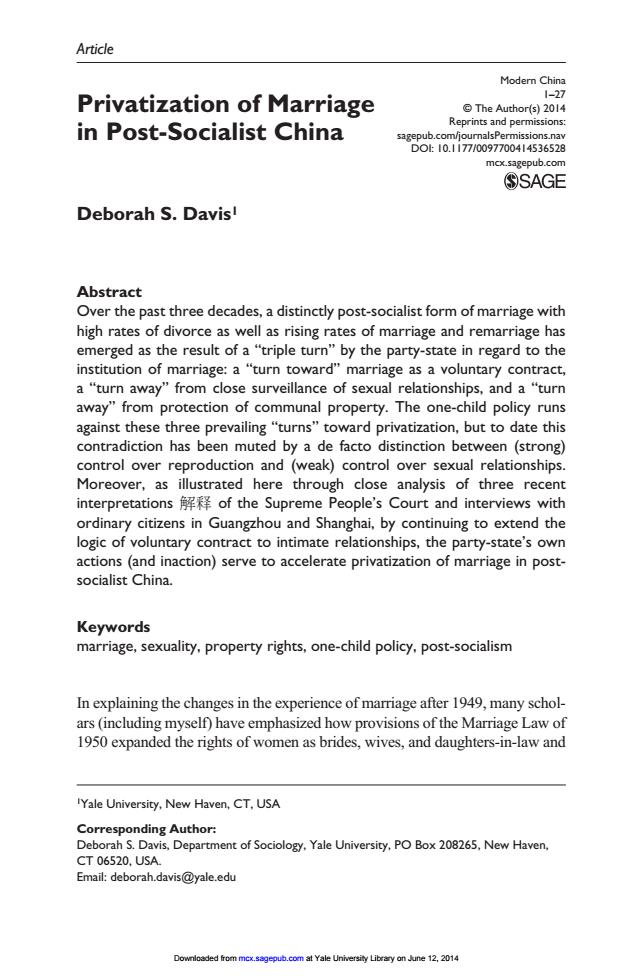正在加载图片...

Article Modern China Privatization of Marriage 1-27 ©The Author(s)20l4 in Post-Socialist China Reprints and permissions: sagepub.com/journalsPermissions.nav D○北10.1177/0097700414536528 mcx.sagepub.com SAGE Deborah S.Davis! Abstract Over the past three decades,a distinctly post-socialist form of marriage with high rates of divorce as well as rising rates of marriage and remarriage has emerged as the result of a"triple turn"by the party-state in regard to the institution of marriage:a "turn toward"marriage as a voluntary contract, a "turn away"from close surveillance of sexual relationships,and a "turn away"from protection of communal property.The one-child policy runs against these three prevailing"turns"toward privatization,but to date this contradiction has been muted by a de facto distinction between(strong) control over reproduction and (weak)control over sexual relationships. Moreover,as illustrated here through close analysis of three recent interpretations of the Supreme People's Court and interviews with ordinary citizens in Guangzhou and Shanghai,by continuing to extend the logic of voluntary contract to intimate relationships,the party-state's own actions (and inaction)serve to accelerate privatization of marriage in post- socialist China. Keywords marriage,sexuality,property rights,one-child policy,post-socialism In explaining the changes in the experience of marriage after 1949,many schol- ars(including myself)have emphasized how provisions of the Marriage Law of 1950 expanded the rights of women as brides,wives,and daughters-in-law and Yale University,New Haven,CT.USA Corresponding Author: Deborah S.Davis,Department of Sociology.Yale University.PO Box 208265.New Haven, CT 06520,USA. Email:deborah.davis@yale.edu Downloaded from mcx.sagepub.com at Yale University Library on June 12,2014Modern China 1–27 © The Author(s) 2014 Reprints and permissions: sagepub.com/journalsPermissions.nav DOI: 10.1177/0097700414536528 mcx.sagepub.com Article Privatization of Marriage in Post-Socialist China Deborah S. Davis1 Abstract Over the past three decades, a distinctly post-socialist form of marriage with high rates of divorce as well as rising rates of marriage and remarriage has emerged as the result of a “triple turn” by the party-state in regard to the institution of marriage: a “turn toward” marriage as a voluntary contract, a “turn away” from close surveillance of sexual relationships, and a “turn away” from protection of communal property. The one-child policy runs against these three prevailing “turns” toward privatization, but to date this contradiction has been muted by a de facto distinction between (strong) control over reproduction and (weak) control over sexual relationships. Moreover, as illustrated here through close analysis of three recent interpretations 解释 of the Supreme People’s Court and interviews with ordinary citizens in Guangzhou and Shanghai, by continuing to extend the logic of voluntary contract to intimate relationships, the party-state’s own actions (and inaction) serve to accelerate privatization of marriage in postsocialist China. Keywords marriage, sexuality, property rights, one-child policy, post-socialism In explaining the changes in the experience of marriage after 1949, many scholars (including myself) have emphasized how provisions of the Marriage Law of 1950 expanded the rights of women as brides, wives, and daughters-in-law and 1Yale University, New Haven, CT, USA Corresponding Author: Deborah S. Davis, Department of Sociology, Yale University, PO Box 208265, New Haven, CT 06520, USA. Email: deborah.davis@yale.edu 536528 MCXXXX10.1177/0097700414536528Modern ChinaDavis research-article2014 Downloaded from mcx.sagepub.com at Yale University Library on June 12, 2014